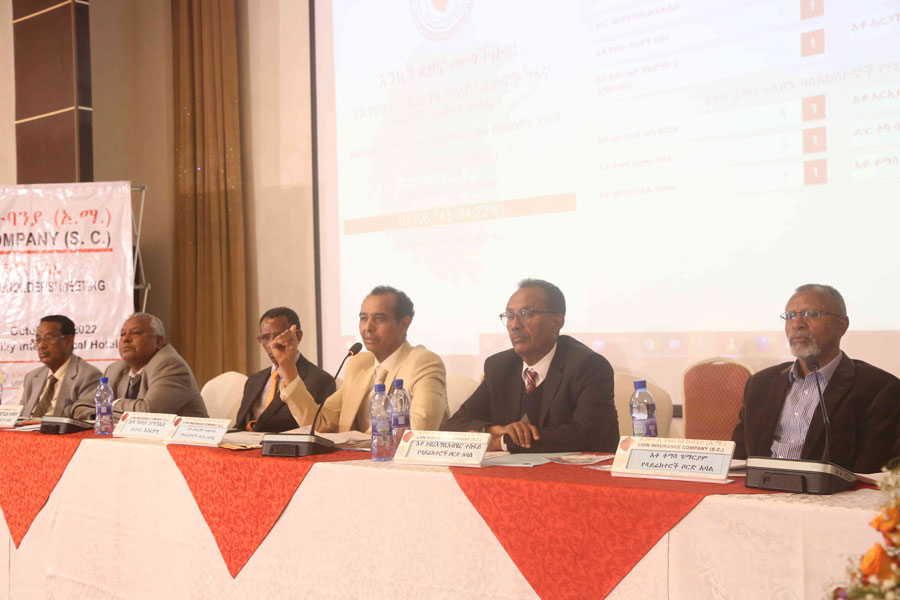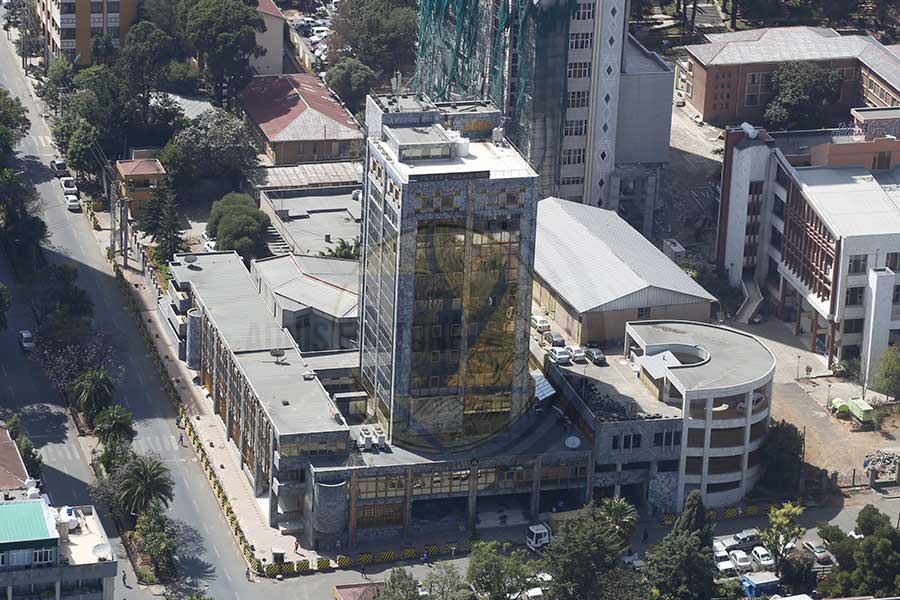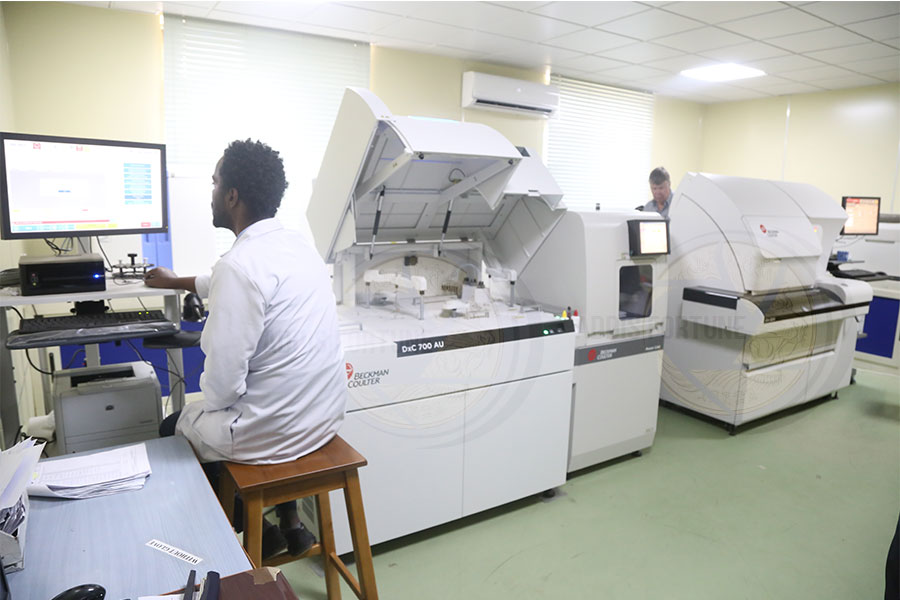
Radar | Feb 19,2022
Lion Bank has emerged from a period of turbulence with a performance that commands attention in an industry where giants loom large. With an 82pc surge in net profit to 489.52 million Br, it defied the odds despite economic uncertainties and the aftermath of a devastating war in the north. The impressive rebound, while contrasted against its larger peers, tells a story of resurgence and operational grit.
However, a closer analysis reveals a picture of recovery that, while significant, suggests Lion Bank is passing through trying times. The recovery is particularly impressive considering that its net profit had plummeted to 334.5 million Br the year before from a high of 643.1 million Br two years ago. Despite these gains, Lion Bank's performance, when viewed against the backdrop of its peers — such as Abay (1.55 billion Br), Buna (949 million Br), and Berhan (508 billion Br) banks net profits — paints a picture of an institution that is still finding its footing in a competitive industry.
Following the increase of its par value of the shares to 1,000 Br this year, the earnings per share (EPS) Lion Bank posted soared from 10.6pc to 18.73pc. Although it is significantly lower than Abay's 36pc and Buna's 23.6pc, it is higher than Berhan Bank's 15.6pc.
Abdulmenan Mohammed (PhD), a financial analyst based in London, pointed to the growth in financial and non-financial intermediation income and a significant reduction in provision for loan impairment as crucial to the Lion Bank's promising results. Interest income saw a 10pc growth to 4.17 billion Br, while fees and commissions jumped by 143.9pc to 179.44 million Br. Other operating income also experienced a substantial rise of 134.1pc to 298.23 million Br.
According to analysts, these figures indicate the Bank's ability to leverage its core operations for growth, even in a challenging economic environment.
The Bank's interest expense modestly increased by 11.9pc to 1.97 billion Br while it significantly recovered from the losses arising from a substantial provision of losses for loan impairment. Expenses surged after the stagnation of the preceding year. The total staff expenses rose by 21pc to 953.16 million Br, lower than Abay (1.91 billion Br), Berhan (1.62 billion Br) and Buna (2.08 billion Br). Other operating expenses soared by 46.6pc to 551 million Br.
However, Lion Bank's foreign exchange operations have been a cause for concern, with losses amounting to 197.57 million Br in the 2022/23 operation year, following losses of 176.73 million Br and 174.08 million Br in the preceding two years. This trend has raised alarms about the Bank's forex risk management strategies and their adequacy in averting such losses.
"This is very shocking," said Abdulmenan, "Executives should explain."
The Bank's President or Board Chairman were not available for comment despite repeated attempts by Fortune.
However, the Bank's strategic focus on improving loan performance appears to be paying off, with a reversal from a loss of 518.89 million Br in 2021/22 and 689.75 million Br in the previous year to a rebound gain of 38.77 million Br. Nonetheless, the provision for impairment of other assets has surged to 265.43 million Br, indicating potential vulnerabilities in asset quality that could pose risks to the Bank's financial health.
Lion Bank's asset base grew by 7.9pc to 35.58 billion Br, with loans and advances increasing by 12.13pc to 26.69 billion Br. The growth in assets and loans underpins the Bank's recovery efforts and commitment to expanding its lending operations. However, its deposit mobilisation, which saw a 5.2pc increase to 27.31 billion Br, suggested a cautious approach by depositors, possibly influenced by the Bank's recent adversities.
During the annual meeting at the Hilton Hotel in December, Lion Bank's President Daniel told shareholders the performance lagged behind some of its peers, attributing it to the belated recovery from the turmoil of conflict.
"Its current recovery should be encouraged," he noted.
The Bank's operational stability was put to the test during the war in Tigray Regional State, which broke out in November 2020, with half of its 278 branches temporarily out of operation and employees displaced. Board Chairman Alem Asfaw sees the reinstallation and reopening of branches as a significant undertaking that subjected the Bank to increased rehabilitation costs. These operational challenges were further compounded by rising non-performing loan (NPL) ratios and difficulties in loan recoveries.
Despite these limitations, Lion Bank's executive team, under the presidency of Daniel Tekeste, has been responsible for steering the Bank towards recovery. Daniel, who has over two decades of experience in banking, including a tenure with the state-owned Commercial Bank of Ethiopia (CBE), has overseen the addition of 10 new branches, expanding Lion Bank's footprint to 288 branches.
Hareg Terefe, deputy manager at the Stadium Branch, worked for 11 years. She believes that fewer loans to customers impacted the Bank's ability to earn more interest income, despite her branch's location being favourable for getting corporate customers.
"We've a long way to go," she told Fortune.
Under Daniel's watch, the Lion Bank has also wrestled with a high turnover rate of 10pc of 5,667 workforce, one of the highest rates in the industry, calling for strategies to retain talent and enhance operational efficiency.
Lion Bank's efforts to bolster its financial standing have seen its paid-up capital grow by 2.3pc to 2.63 billion Br, a move aimed at consolidating its capital base ahead of the Central Bank's minimum threshold capital of five billion Birr set for 2026. However, its capital adequacy ratio (CAR) slightly declined to 13.3pc, signalling a need for continued attention to maintain financial stability.
Its liquidity position presents a mixed picture. While its cash and bank balances grew by 2.9pc to 3.92 billion Br, the ratio to total assets has slightly declined. This, coupled with a loan-to-deposit ratio increase to 97.7pc from 91.7pc, raises concerns about potential liquidity constraints. Such a ratio level is one of the highest in the industry, calling for prudent liquidity management.
"There should be extra caution," Abdulmenan said.
Shareholders like Mekonnen Tesfaye expressed concerns about the return on their investments, especially when compared to dividends from other banks, such as Awash Bank, which leads with a net profit of 6.9 billion Br. His observations on the need for improvements reflect Lion Bank's broader challenges in enhancing its competitiveness and appeal to the market.
"They should work on changing customer service culture and expand their digital sphere," he recommended.
PUBLISHED ON
Feb 17,2024 [ VOL
24 , NO
1242]

Fortune News | Feb 25,2023

Radar | Mar 27,2021

Radar | Oct 17,2020

Fortune News | Mar 05,2022

Fortune News | Jun 08,2019

Dec 22 , 2024 . By TIZITA SHEWAFERAW
Charged with transforming colossal state-owned enterprises into modern and competitiv...

Aug 18 , 2024 . By AKSAH ITALO
Although predictable Yonas Zerihun's job in the ride-hailing service is not immune to...

Jul 28 , 2024 . By TIZITA SHEWAFERAW
Unhabitual, perhaps too many, Samuel Gebreyohannes, 38, used to occasionally enjoy a couple of beers at breakfast. However, he recently swit...

Jul 13 , 2024 . By AKSAH ITALO
Investors who rely on tractors, trucks, and field vehicles for commuting, transporting commodities, and f...

Oct 18 , 2025
The political establishment, notably the ruling party and its top brass, has become p...

Oct 11 , 2025
Ladislas Farago, a roving Associated Press (AP) correspondent, arrived in Ethiopia in...

Oct 4 , 2025
Eyob Tekalegn (PhD) had been in the Governor's chair for only weeks when, on Septembe...

Sep 27 , 2025
Four years into an experiment with “shock therapy” in education, the national moo...